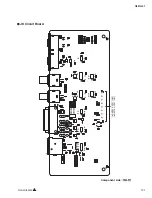
Appendix A: Troubleshooting
75
Determining correct actuator feedback wiring
After installing a new actuator or potentiometer, or due to age-related potentiometer wear, the
actuator might not move correctly. Common symptoms include:
The actuator oscillating back and forth
The actuator not traveling the full stroke during calibration
The feedback potentiometer wiring must be properly connected to the control. Determining the
correct wiring can be difficult on some actuators or potentiometers.
Potentiometers have three wires: positive (+), negative (–), and feedback (FB). If the feedback wire
is not connected to the FB terminal on the control, the actuator will not function properly.
Because the wires are often different colors and are not always labeled the same as above, measuring
the resistance between the wires is the best way to determine which wire is the feedback wire.
Follow the steps below to measure the resistance and determine the correct wiring.
Before checking the potentiometer wires, verify that the power wires are
properly connected.
Test the actuator using stage test mode.
1.
Manually move the actuator away from the end of its stroke by at least a quarter of its total
stroke.
2.
Disconnect all three potentiometer wires from the control.
3.
Number the wires 1, 2, and 3, in any order.
4.
Set your ohmmeter to measure the potentiometer’s maximum resistance, normally 20,000 Ω.
5.
Measure and record the resistance between wires 1 and 2. _________ Ω
6.
Measure and record the resistance between wires 1 and 3. _________ Ω
7.
Measure and record the resistance between wires 2 and 3. _________ Ω
8.
The pair of wires with the highest measured value are the positive and negative wires. Connect
the wires to the positive and negative actuator terminals on the control. At this time, do not be
concerned with which wire you connect to which terminal.
9.
Connect the remaining wire to the feedback terminal.
10.
Test the actuator using automatic mode to see if the control moves it properly. If the actuator
moves in the opposite direction than it is supposed to, switch the positive and negative wires on
the control.
















































